New Faculty 2014-2015
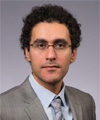
Hussein Aluie
Assistant Professor of Mechanical Engineering
Hussein Aluie joined the Department of Mechanical Engineering as assistant professor in July 2014. Following his PhD work at Johns Hopkins University in 2009 on hydrodynamic and magneto hydrodynamic turbulence, Hussein joined Los Alamos National Lab as a postdoctoral research associate.
Hussein’s research interests are in fluid dynamics of both neutral fluids and plasmas; nonlinear multi-scale science, including highly compressible flows; and scientific computing. Areas of application range from astrophysical plasmas to geophysical fluid dynamics, satellite observations and experimental measurements, and global-scale climate predictions. His work spans high-performance computations, the analysis of huge data sets, semi-empirical physical reasoning, abstract mathematical analysis, and rigorous analysis of complex flows.
His work has focused on the numerical simulation and analysis of how different length-scales in a flow interact and communicate with each other—a profound problem hindering our ability to accurately model and predict the behavior of complex flows. He has applied this methodology to study energy cascades across scales in fluids and plasmas of variable density, in oceanographic flows, and in other nonlinear complex flows.
Hussein has published in journals including Nature, Journal of Fluid Dynamics, Physical Review Letters, and Physics of Fluids. His research has been funded by the National Science Foundation and the Department of Energy. Hussein expects to establish strong collaborations with scientists and engineers in the Laboratory for Laser Energetics and with experimentalists and computational scientists in fluid dynamics here at the university.
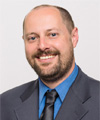
John Criswell
Assistant Professor of Computer Science
John Criswell is assistant professor in the Department of Computer Science. Prior to joining the University of Rochester, John was a research programmer and graduate student at the University of Illinois. Before that, he worked at Argus Systems Group, Inc., where his work included enhancements to the AIX operating system kernel and writing utilities that utilized mandatory access controls to improve system security. He earned his BS in computer science in 2003, and PhD in computer science in 2014, both from the University of Illinois at Urbana-Champaign.
John’s research interests focus on computer security and novel applications of compiler and operating system technology. His primary research work is on the Secure Virtual Architecture (SVA). SVA enforces security policies on commodity operating system and application code via compiler instrumentation, thereby providing strong protection against sophisticated attacks. Using SVA, John built the first systems that provide strong comprehensive memory safety protection and complete controlflow integrity enforcement to commodity operating system kernels such as Linux and FreeBSD. More recently, he has used SVA to create the Virtual Ghost system that protects application data and control-flow from a compromised operating system kernel.
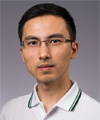
Philip Guo
Assistant Professor of Computer Science
Philip Guo is assistant professor of computer science at the University. He received a PhD in computer science from Stanford University in 2012, and BS and MEng degrees in electrical engineering and computer science from MIT in 2006. His PhD dissertation was one of the first to identify the unique software needs of data scientists and to develop five new tools to address those needs. One such tool from his dissertation, CDE, has been used by more than 10,000 people.
His main research interests are in human-computer interaction (HCI), especially building tools for informal learning and online education. He is the creator of Online Python Tutor (pythontutor.com), a web-based computer science education tool that has been used by more than 500,000 people in more than 165 countries. He plans to teach classes related to web programming, dynamic programming languages, human-computer interaction, and educational technology.
In 2012, he wrote a popular free e-book called The PhD Grind (phdgrind.com), which is the first known detailed account of an entire PhD experience, with more than 300,000 downloads so far. Philip also writes a monthly blog column for the Communications of the ACM, and his personal website (pgbovine.net) gets more than 250,000 visitors each year.
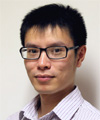
Ji Liu
Assistant Professor of Computer Science
Ji Liu is assistant professor in the Department of Computer Science. He received his PhD in computer science from the University of Wisconsin– Madison in 2014, his MS in computer science from Arizona State University in 2010, and his BE degree in automation from University of Science and Technology of China in 2005.
His research interests include machine learning and optimization, as well as their applications in such areas as big data analytics, data mining, and computer vision. He won the Knowledge Discovery and Data Mining (KDD) best research paper award honorable mention in 2010.
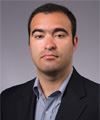
Gonzalo Mateos
Assistant Professor of Electrical and Computer Engineering
Gonzalo Mateos has been assistant professor in the Department of Electrical and Computer Engineering since 2014. In 2013, he was a visiting scholar in Carnegie Mellon University’s Computer Science Department. From 2003 to 2006, he worked as a systems engineer in the Automation Technologies Division at ABB in Uruguay. He received his BSc degree in electrical engineering from Universidad de la Republica, Uruguay, in 2005, and MSc and PhD degrees in electrical engineering from the University of Minnesota in 2009 and 2012.
Gonzalo’s research interests lie in the areas of statistical learning from big data, network science, wireless communications, and signal processing. His current research focuses on algorithms, analysis, and application of statistical signal processing tools to dynamic network health monitoring, social networks, the power grid, and big data analytics. Since 2012, he has served on the editorial board of the EURASIP Journal on Advances in Signal Processing. He received the Best Student Paper Award at the 13th IEEE Workshop on Signal Processing Advances in Wireless Communications, held in Cesme, Turkey in 2012, and was a finalist in the Student Paper Contest at the 14th IEEE DSP Workshop in 2011, held in Sedona, Arizona. His doctoral work has been recognized with the 2013 University of Minnesota’s Best Dissertation Award (honorable mention) across all physical sciences and engineering areas.
